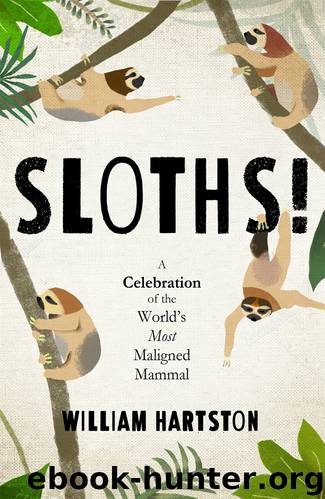Sloths by William Hartston

Author:William Hartston
Language: eng
Format: epub
Publisher: Atlantic Books
Published: 2019-05-09T16:00:00+00:00
You must avoid sloth, that wicked siren.
Horace, Satires (c. 30 BC)
Having established that sloths are not slothful but merely supreme examples of energy efficiency, it is time to deal with the so-called Deadly Sin of Sloth.
The word ‘sloth’ itself does not occur in the King James Bible, but there are seventeen instances of ‘slothful’ or ‘slothfulness’ (of which twelve feature in the Book of Proverbs), and none of those is complimentary. When we get to the New Testament, admonition towards slothfulness becomes more severe. Matthew 25:26 refers to a ‘wicked and slothful servant’, while St Paul, in his epistle to the Romans (12:11) advises them to be ‘Not slothful in business’ but ‘fervent in spirit; serving the Lord’, while he also comes straight out to the Hebrews (6:12), advising them ‘That ye be not slothful’. The Book of Ecclesiasticus in the Apocrypha (22:1–2) comes down most heavily of all on sloth, telling us that ‘A slothful man is compared to a filthy stone, and every one will hiss him out to his disgrace. A slothful man is compared to the filth of a dunghill; every man that takes it up will shake his hand.’ (Presumably this handshake is to shake off the dung rather than by way of introduction.) We need to delve rather deeper into the history of the relationship of the Christian Church to sloth, however, to understand how it became a Deadly Sin.
The Seven Deadly Sins owe their origin to the writings of the fourth-century monk Evagrius of Pontius (345–99), also known as Evagrius the Solitary. While pursuing an ecclesiastical career at Constantinople, where he became a deacon, then archdeacon, Evagrius fell in love with a married woman but is said to have been saved by having a vision in which he was imprisoned by soldiers at the request of the woman’s husband. Saved from such a fate, he put his near-disaster down to a combination of vanity and lust and set about drawing up a list of evil thoughts or temptations. He ended up with a list of eight such sins which, in order of seriousness, were: Gluttony, Lust, Avarice, Sadness, Anger, Acedia, Vainglory and Pride. These were the temptations that Evagrius saw monks facing that might lure them away from their religious duties and studies.
The nearest to Sloth in this list is Acedia (also known as Accidie), which was the term used for a sort of spiritual listlessness, a mixture of apathy, boredom, laziness and a rejection of God’s divine message. Evagrius’s list underwent various modifications under several hands over the next couple of centuries, but Acedia remained one of the ‘Evil Temptations’, or ‘Capital Vices’, as they were generally called until 590 when Pope Gregory (St Gregory, or Gregory the Great) revised the list by combining Vainglory (a sort of unjustified vanity) with Pride, Acedia with Sadness, and adding Envy to bring the list back up to seven, which are more or less the Deadly Sins we know today.
The precise nature of the sin
Download
This site does not store any files on its server. We only index and link to content provided by other sites. Please contact the content providers to delete copyright contents if any and email us, we'll remove relevant links or contents immediately.
The Lonely City by Olivia Laing(4783)
Animal Frequency by Melissa Alvarez(4442)
All Creatures Great and Small by James Herriot(4294)
Walking by Henry David Thoreau(3938)
Exit West by Mohsin Hamid(3807)
Origin Story: A Big History of Everything by David Christian(3677)
COSMOS by Carl Sagan(3603)
How to Read Water: Clues and Patterns from Puddles to the Sea (Natural Navigation) by Tristan Gooley(3444)
Hedgerow by John Wright(3338)
How to Read Nature by Tristan Gooley(3314)
The Inner Life of Animals by Peter Wohlleben(3296)
How to Do Nothing by Jenny Odell(3287)
Project Animal Farm: An Accidental Journey into the Secret World of Farming and the Truth About Our Food by Sonia Faruqi(3207)
Origin Story by David Christian(3184)
Water by Ian Miller(3166)
A Forest Journey by John Perlin(3053)
The Plant Messiah by Carlos Magdalena(2913)
A Wilder Time by William E. Glassley(2846)
Forests: A Very Short Introduction by Jaboury Ghazoul(2823)
